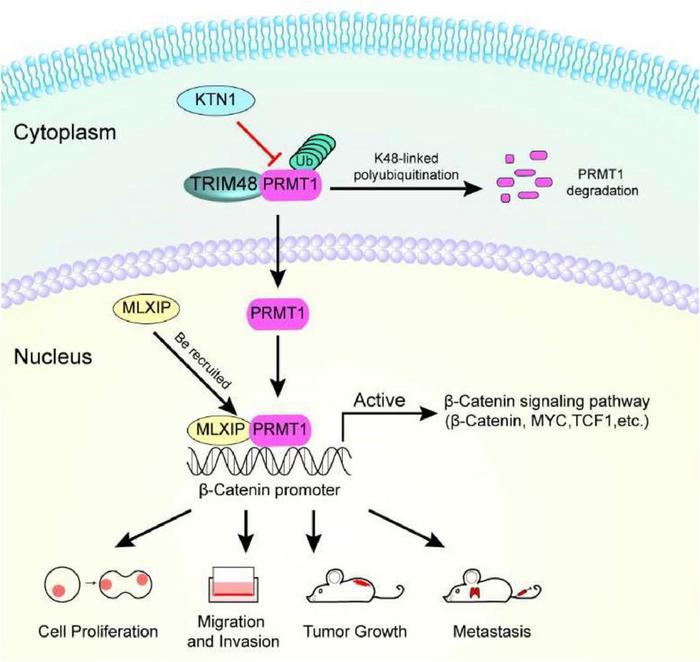In a study published in the journal Genes & Diseases, researchers from Southwest University, and Southwest Medical University investigated PRMT1, a protein previously known to be overexpressed in gastric cancer cells. Using short hairpin RNA (shRNA) technology, they reduced the expression of PRMT1 in HGC-27 and MKN-45 cells. Additionally, they treated the cells with PRMT1 inhibitors to study the effects on cell proliferation and migration. The findings have unveiled a groundbreaking mechanism through which Protein arginine methyltransferase 1 (PRMT1) promotes the proliferation and spread of gastric cancer (GC) cells. Analysis from the Oncomine and The Cancer Genome Atlas (TCGA) databases revealed a pronounced overexpression of PRMT1 in gastric cancer tissues, which is associated with poor patient prognosis. This overexpression plays a significant role in gastric cancer progression, as silencing PRMT1 diminishes the proliferation and migration rate of GC cells. Intriguingly, PRMT1 directly binds to and activates the β-catenin signaling pathway, a key player in cell growth and metastasis, by targeting its promoter. The study also identified MLXIP, a transcription factor, as a PRMT1-binding protein, suggesting that PRMT1 possibly recruits MLXIP to the β-catenin promoter, further underlining its intricate role in GC dynamics. Additionally, Kinectin (KTN1) has been found to interact with PRMT1, offering another layer of regulation that could impact PRMT1’s function in gastric cancer.The findings point toward new potential therapeutic targets for gastric cancer.

Credit: Genes & Diseases
In a study published in the journal Genes & Diseases, researchers from Southwest University, and Southwest Medical University investigated PRMT1, a protein previously known to be overexpressed in gastric cancer cells. Using short hairpin RNA (shRNA) technology, they reduced the expression of PRMT1 in HGC-27 and MKN-45 cells. Additionally, they treated the cells with PRMT1 inhibitors to study the effects on cell proliferation and migration. The findings have unveiled a groundbreaking mechanism through which Protein arginine methyltransferase 1 (PRMT1) promotes the proliferation and spread of gastric cancer (GC) cells. Analysis from the Oncomine and The Cancer Genome Atlas (TCGA) databases revealed a pronounced overexpression of PRMT1 in gastric cancer tissues, which is associated with poor patient prognosis. This overexpression plays a significant role in gastric cancer progression, as silencing PRMT1 diminishes the proliferation and migration rate of GC cells. Intriguingly, PRMT1 directly binds to and activates the β-catenin signaling pathway, a key player in cell growth and metastasis, by targeting its promoter. The study also identified MLXIP, a transcription factor, as a PRMT1-binding protein, suggesting that PRMT1 possibly recruits MLXIP to the β-catenin promoter, further underlining its intricate role in GC dynamics. Additionally, Kinectin (KTN1) has been found to interact with PRMT1, offering another layer of regulation that could impact PRMT1’s function in gastric cancer.The findings point toward new potential therapeutic targets for gastric cancer.
The study unveils a novel molecular mechanism of PRMT1’s role in advancing gastric cancer, mediated by the β-catenin signaling pathway. The identified PRMT1-MLXIP-β-catenin axis could become a pivotal target for future therapeutic strategies against gastric cancer. These findings could pave the way for developing gene therapies targeting PRMT1 or associated pathways, offering hope to millions diagnosed with this aggressive cancer.
###
References
DOI
10.1016/j.gendis.2023.02.006
Original Source URL
https://doi.org/10.1016/j.gendis.2023.02.006
Funding information
The National Natural Science Foundation of China (82203339), The Postdoctoral Research Foundation of China (2021M692679), The Chongqing Postdoctoral Science Foundation (China) (7820100607), The Natural Science Foundation Project of Chongqing (China) (cstc2021jcyj-bsh0067 and cstc2022ycjh-bgzxm0145).
About Genes & Diseases
Genes & Diseases is a journal for molecular and translational medicine. The journal primarily focuses on publishing investigations on the molecular bases and experimental therapeutics of human diseases. Publication formats include full length research article, review article, short communication, correspondence, perspectives, commentary, views on news, and research watch.
Journal
Genes & Diseases
DOI
10.1016/j.gendis.2023.02.006
Subject of Research
Not applicable
Article Title
PRMT1 promotes the proliferation and metastasis of gastric cancer cells by recruiting MLXIP for the transcriptional activation of the β-catenin pathway
Article Publication Date
31-Jul-2023
COI Statement
The authors declare that they have no competing interests.



